Related Research Articles
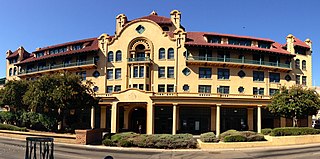
Stockton is a city and the county seat of San Joaquin County in the Central Valley of the U.S. state of California. Stockton was founded by Captain Charles Maria Weber in 1849 after he acquired Rancho Campo de los Franceses. The city is named after Robert F. Stockton, and it was the first community in California to have a name not of Spanish or Native American origin. The city is located on the San Joaquin River in the northern San Joaquin Valley and had an estimated population of 312,697 by the California Department of Finance for 2019. Stockton is the 13th largest city in California and the 62nd largest city in the United States. It was named an All-America City in 1999, 2004, 2015 and again in 2017.

The United Farm Workers of America, or more commonly just United Farm Workers (UFW), is a labor union for farmworkers in the United States. It originated from the merger of two workers' rights organizations, the Agricultural Workers Organizing Committee (AWOC) led by organizer Larry Itliong, and the National Farm Workers Association (NFWA) led by César Chávez and Dolores Huerta. They became allied and transformed from workers' rights organizations into a union as a result of a series of strikes in 1965, when the mostly Filipino farmworkers of the AWOC in Delano, California, initiated a grape strike, and the NFWA went on strike in support. As a result of the commonality in goals and methods, the NFWA and the AWOC formed the United Farm Workers Organizing Committee on August 22, 1966. This organization was accepted into the AFL-CIO in 1972 and changed its name to the United Farm Workers Union.

State Route 4 is a state highway in the U.S. state of California, routed from Interstate 80 in the San Francisco Bay Area to State Route 89 in the Sierra Nevada. It roughly parallels the Sacramento-San Joaquin River Delta, a popular area for boating and fishing, with a number of accesses to marinas and other attractions. After crossing the Central Valley, the highway ascends up the Sierra foothills. It passes through Ebbetts Pass and contains the Ebbetts Pass Scenic Byway, a National Scenic Byway.

Dolores Clara Fernández Huerta is an American labor leader and civil rights activist who, with Cesar Chavez, is a co-founder of the National Farmworkers Association, which later became the United Farm Workers (UFW). Huerta helped organize the Delano grape strike in 1965 in California and was the lead negotiator in the workers' contract that was created after the strike.
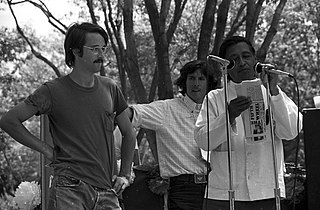
The Delano grape strike was a labor strike organized by the Agricultural Workers Organizing Committee (AWOC), a predominantly Filipino and AFL-CIO-sponsored labor organization, against table grape growers in Delano, California to fight against the exploitation of farm workers. The strike began on September 8, 1965, and one week later, the predominantly Mexican National Farmworkers Association (NFWA) joined the cause. In August 1966, the AWOC and the NFWA merged to create the United Farm Workers (UFW) Organizing Committee.
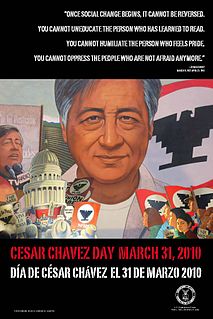
Cesar Chavez Day is a U.S. federal commemorative holiday, proclaimed by President Barack Obama in 2014. The holiday celebrates the birth and legacy of the civil rights and labor movement activist Cesar Chavez on March 31 every year.
Ernesto Mangaoang was a Filipino American labor organizer. A communist and longtime leader of immigrant Filipino laborers, Mangaoang was closely associated with Chris Mensalvas, and was a personal friend of the famous Filipino American intellectual and activist Carlos Bulosan.
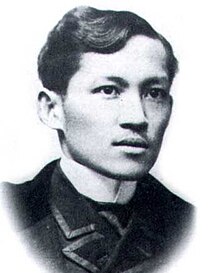
José Protasio Rizal Mercado y Alonso Realonda was a Filipino nationalist and polymath during the tail end of the Spanish colonial period of the Philippines. He is tagged as the national hero of the Filipino people. An ophthalmologist by profession, Rizal became a writer and a key member of the Filipino Propaganda Movement, which advocated political reforms for the colony under Spain.

The Luce–Celler Act of 1946, Pub. L. No. 79-483, 60 Stat. 416, is an Act of the United States Congress which provided a quota of 100 Filipinos and 100 Indians from Asia to immigrate to the United States per year, which for the first time allowed these people to naturalize as American citizens. Upon becoming citizens, these new Americans could own property under their names and even petition for their immediate family members from abroad.

The history of Filipino Americans begins in the 16th century when Filipinos first arrived in what is now the United States. The first Filipinos came to what is now the United States due to the Philippines being part of New Spain. Until the 19th century, the Philippines continued to be geographically isolated from the rest of New Spain in the Americas but maintained regular communication across the Pacific Ocean via the Manila galleon. Filipino seamen in the Americas settled in Louisiana, and Alta California, beginning in the 18th century. By the 19th century, Filipinos were living in the United States, fighting in the Battle of New Orleans and the American Civil War, with the first Filipino becoming a naturalized citizen of the United States before its end. In the final years of the 19th century, the United States went to war with Spain, ultimately annexing the Philippine Islands from Spain. Due to this, the History of the Philippines merged with that of the United States, beginning with the three-year-long Philippine–American War (1899-1902), which resulted in the defeat of the First Philippine Republic, and the attempted Americanization of the Philippines.

Larry Dulay Itliong, also known as "Seven Fingers", was a Filipino-American labor organizer. He organized West Coast agricultural workers starting in the 1930s, and rose to national prominence in 1965, when he, Philip Vera Cruz, Benjamin Gines and Pete Velasco, walked off the farms of area table-grape growers, demanding wages equal to the federal minimum wage, that became known as the Delano grape strike. He has been described as "one of the fathers of the West Coast labor movement." He is regarded as a key figure of the Asian American Movement.

Anti-Filipino sentiment refers to the general dislike or hatred towards the Philippines, Filipinos or Filipino culture. This can come in the form of direct slurs or persecution, in the form of connoted microaggressions, or depictions of the Philippines or the Filipino people as being inferior in some form psychologically, culturally or physically.
The Watsonville riots was a period of racial violence which took place in Watsonville, California from January 19 to January 23, 1930. Involving violent assaults on Filipino American farm workers by local residents opposed to immigration, the riots highlighted the racial and socioeconomic tensions in California's agricultural communities.
Chris Delarna Mensalvas, also archived as Chris D. Mensalvas and Chris D. Mensalves was a Filipino American union organizer most active during the 1940s and 1950s. A communist and leader of the immigrant Filipino labor movement in the Pacific Northwest, Mensalvas was closely associated with famous Filipino American author and activist Carlos Bulosan as well as Ernesto Mangaoang and Philip Vera Cruz.
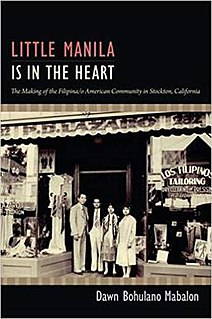
Little Manila Is in the Heart: The Making of the Filipina/o American Community in Stockton, California by Dawn Bohulano Mabalon is a book with three parts that depict the formation of Filipina/o American identities and community in the Little Manila in Stockton, California during the twentieth century. The book touches on issues including immigration, colonialism, race, gender, labor, and activism. Bohulano Mabalon draws on rich oral histories as well as historical archives such as the National Pinoy Archives and Filipino American National Historical Society to provide an analysis on Filipina/o experience. The book won the honorable mention for the Frederick Jackson Turner Award by the Organization of American Historians in 2014.

Dawn Bohulano Mabalon was an American academic who worked on documenting the history of Filipino Americans. Mabalon was born in Stockton, and earned her doctoral degree from Stanford University; she later taught at San Francisco State University. Mabalon was the co-founder of The Little Manila Foundation, which worked to preserve Little Manila in Stockton, California. During her life, her work elevated the topic of the history of Filipino Americans, in Central California in particular.

San Joaquin Depot is site of military storage bases. The facilities of San Joaquin Depot: are the Tracy Facility, the Sharpe Facility and former Stockton's Rough & Ready Island depot. The depots are in San Joaquin County, California near Stockton, California. These depots purchased, stored and shipped supplies needed for the World War II efforts in the Pacific War and some supplies to the Western Front. The depots were in an ideal location, at a safe inland port served by the San Joaquin River, which has railroad lines, a network of roads to California bases and nearby airports, including the Stockton Army Airfield. The depots were run the War Department's Defense Logistics Agency. The Defense Logistics Agency ran 22 large depots during World War 2.

Flora Arca Mata was an American teacher in Stockton, California. She became the first Filipino American teacher in California. In 2019, a new elementary school was named after her in the Stockton Unified School District.
Manilatown was a Filipino American neighborhood in San Francisco, which thrived from the 1920s to late 1970s. The district encompassed a three block radius around Kearny and Jackson Streets, next to Chinatown. The neighborhood was known for the International Hotel, a single room occupancy (SRO) hotel where many of the residents lived. Manilatown was also home to many businesses that catered to the Filipino American community, such as Manila Cafe, New Luneta Cafe, Bataan Lunch, Casa Playa, Sampagita Restaurant, Blanco's Bar, Lucky M. Pool Hall, and Tino's Barber Shop. At its height, over 1000 residents lived in Manilatown, and it contained a total of 30,000 transient laborers. From the late 1960s-70s, the neighborhood was transformed by city initiatives that aimed to gentrify the area. By 1977, the neighborhood had been largely destroyed, and it became part of Chinatown.
The manong generation were the first generation of Filipino immigrants to arrive, en masse, to the United States. They formed some of the first Little Manila communities in the United States, and they played a pivotal role in the farmworker movement. The term manong comes from the Ilocano word for "elder brother," while manang means "elder sister."
References
- ↑ Ellison, Micah. "The Local 7/ Local 37 Story: Filipino American Cannery Unionism in Seattle 1940-1959". Seattle Civil Rights and Labor History Project.
- ↑ Fitzgerald, Michael (March 30, 2014). "A gaping hole in new film on Chavez". recordnet.com. Stockton, California . Retrieved December 25, 2018.
- ↑ Antonio T. Tiongson; Edgardo V. Gutierrez; Ricardo Valencia Gutierrez; Ricardo V. Gutierrez (2006). Positively No Filipinos Allowed: Building Communities and Discourse. Temple University Press. pp. 81–83. ISBN 978-1-59213-123-5.
- ↑ "Little Manila Publicity". scholarlycommons.pacific.edu. Retrieved February 14, 2021.